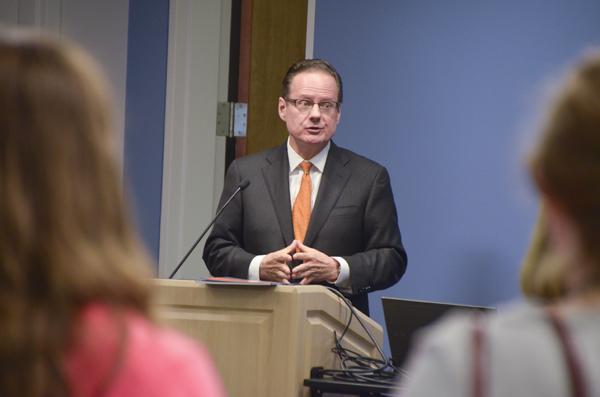Two faculty committees will spend this year shaping interdisciplinary research centers on food and global economics – creations that administrators hope will help lure top scholars and fundraising dollars.
The centers would be GW’s latest additions to a number of institutes which GW is using to push interdisciplinary research across its schools. Since Vice President for Research Leo Chalupa became GW’s first research head four years ago, the University has launched five multi-disciplinary research institutes off the ground and has committed to five others.
The University’s strategic plan calls for 10 to 12 new institutes in the next decade, though setting them up can be a long and costly project. GW expects to spend $20 million to $30 million in the process of establishing the institutes.
Interest in food research surged, Chalupa said, when his office received 18 proposals for food-related research last year and awarded grants to six. University President Steven Knapp’s wife, Diane, started an urban food task force at GW in 2010.
A global economic institute would also build on GW’s current strengths, said Michael Brown, dean of the Elliott School of International Affairs, who is leading faculty discussions on the topic.
“GW is exceptionally well-positioned to make great strides in global development studies; we are now identifying our priorities and exploring the possibilities,” Brown said in an email.
He pointed to the Elliott School’s graduate program in international development studies as part of the University’s foundation in the topic, but noted that GW is in the early stages of discussions about whether GW should move forward with creating the institute
Provost Steven Lerman said he wants the committee to make a decision about whether or not to move forward by the end of the academic year, so that a director search could begin at the end of this year or early next year.
Administrators want to see institutes help strengthen GW’s research culture and bring professors together to tackle big issues through multiple academic disciplines.
Vice President for Development and Alumni Relations Mike Morsberger said his office will also use the institutes to energize donors who are interested in the research topics.
Some institutes, like one started on global women’s issues last year, can be up and running within two to three years. But others, such as an autism institute, require costly lab facilities and outside hires who can bring in grant money – slowing down the centers’ start dates.
Chalupa pitched an autism center in 2010, and in 2012 GW hired Heather Russell, a fundraiser for Chalupa’s office, who has focused on the autism institute.
GW could hire a director by the middle of next year if it gets enough donations, Chalupa said, adding that the University is courting several different donor prospects.
His office also announced plans for a cancer institute last year, which would require at least $10 million to start up. Chalupa said his office will start searching for a director once that commitment is finalized.
He added that there is a commitment, but would not say from whom or how much because it is not finalized. He said he expects it to be finalized by the middle of next year.
“We just need to see how the development goes in terms of how we proceed, because those are tied very closely,” Chalupa said. “Cancer is more expensive. We want somebody who can come here, perhaps an MD-Ph.D., and bring large amounts of grant money with him or her.”
The research office is also creating a big data research cluster to be housed on the Virginia Campus for Science and Technology, which already houses its first institute in computational biology.
The search for a director of a second institute in genomics has taken off, with Chalupa planning to start interviewing applicants possibly in the next few months.
He said he tasked Dean of the School of Engineering and Applied Sciences David Dolling with leading faculty discussions about what an engineering institute could focus on, and hopes to start a directors search for such a center next semester.
-Chloe Sorvino contributed to this report.







